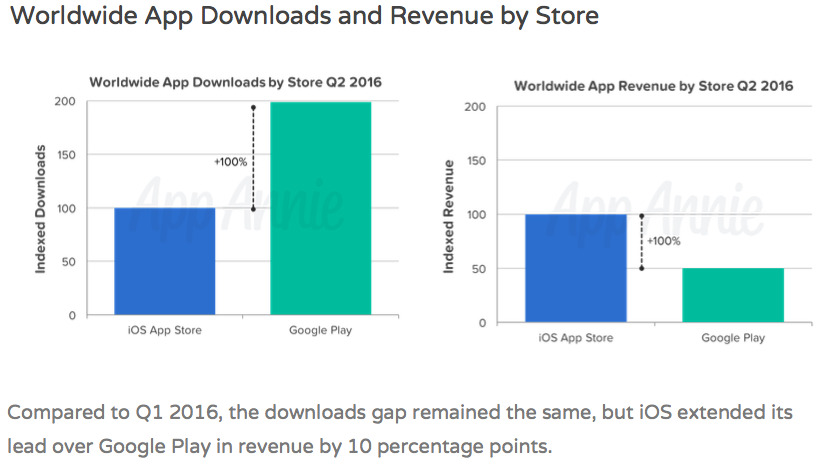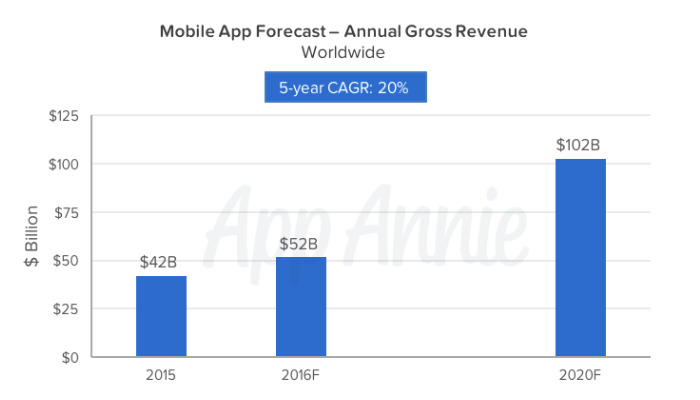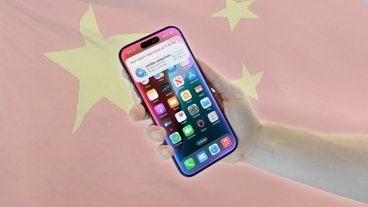A new report examining mobile app revenues shows strong growth for Apple in China and from music and video streaming titles, and another big jump in the revenue lead that its iOS App Store maintains over Android's Google Play.
Half the downloads, twice the revenue
The Q2 report by App Annie shows that that average iOS download now generates four times the revenue for developers compared to Google Play. Despite serving up half the downloads worldwide compared to Google Play, Apple's App Store generated twice the revenue overall.
In January, the group's report for 2015 similarly showed Google Play accounting for twice the total downloads, but noted that Apple's App Store was generating 75 percent more in revenues. For Q1, App Annie reported the App Store download gap had grown to 90 percent of Google Play's revenues.
Apple's steady increases in App Store revenues led the firm to observe in January that "Google must continue to evolve its strategy to help drive more revenue for its developers," and in particular pointed out that "Android market share needs to grow at the high end of the smartphone market to meaningfully drive more revenue share."
Strong App Store growth in China
The firm described App Store growth in China as "explosive," noting that revenues from iOS games in China have surpassed game sales in the U.S. Revenues from iOS games in China have surpassed game sales in the U.S.
Games make up about 75 percent of global iOS revenue, so China's ability to surpass the U.S. and Japan in Q2 in that large segment— even as both of those regions enjoyed healthy growth in gaming on their own— shows the tremendous potential for Apple's services-based income in China.
Two years ago, Apple's U.S. iOS App Store revenue was 2.9 times greater than China's, but last year that gap narrowed to 1.9 times. The U.S. is currently only 1.1 times greater. App Annie predicted that China will likely soon exceed the U.S. in total app revenues.
Google Play is not currently operating in China, although the company has signaled an interest in establishing some market presence there. Google, along with Facebook and Twitter, are officially blocked within China; home grown alternative app markets and social networks have sprung up in their place.
Android missing out on iOS music, video streaming growth
Apps categorized under Music or Entertainment have also experienced rapid growth over the past two years, although iOS has been the primary beneficiary of growing consumer interest in streaming music and video apps.
Revenues from in-app subscriptions in apps including Netflix and HBO Now were a "main driver of revenue growth," the report noted, enabling the Entertainment category on iOS to reach parity with popular streaming music apps.
Google Play also experienced some growth in these categories over the past year, but lags far behind the commercial interest demonstrated on Apple's iOS platform.
Use of apps growing, revenue growth to nearly double by 2020
Refuting a popular media narrative that growth in mobile apps is growing stagnant, the firm noted that "since Q2 2014, time spent in apps has nearly doubled. As our lives become more mobile enabled, apps are at the center of our daily operations."
Growth in mobile app revenues is expected to grow from 2015's $42 billion to $52 billion this year, and reach $102 billion by 2020. Much of that growth will come from emerging markets.
"By 2020 we expect emerging economies to represent 40% of the worldwide revenue," the firm noted, predicting that "India will see the fastest growth."
Apple's all about apps
Apple focused attention on the 20 percent annual growth it experienced in its Services segment last quarter, an increase driven in large part by App Store earnings.
The company directly benefits from App Store sales and In App Purchases, and interest in apps helps to drive demand for premium hardware that runs the latest games and innovative software.
The strategic importance of the App Store is reflected in Apple's decision last winter to move its App Stores out of Eddy Cue's iTunes and iCloud oversight and instead assign them to Phil Schiller, its head of worldwide marketing.
The company has also invested heavily in making it easier to develop iOS apps, apparent in its work on the Swift programing language introduced in 2014 and the company's new Swift Playgrounds for iPad, a new tool designed for teaching the basics of code to a new generation of aspiring programmers.
Apple's focus on apps is also apparent its its portrayal of apps as being "the future of television" on Apple TV, and a renewed effort to make Apple Watch a more effective platform for third party developers with the release of watchOS 3.0.
The company has also made apps— rather than just hardware features— central to its accessibility efforts intended to make the power of computing available to as many people as possible. This year at WWDC, Apple invited deaf-blind accessibility advocate Haben Girma to address third party app developers at its development conference, to encourage them to think about building accessibility into their own apps from the start.
 Daniel Eran Dilger
Daniel Eran Dilger









-m.jpg)






 Charles Martin
Charles Martin
 Christine McKee
Christine McKee
 Wesley Hilliard
Wesley Hilliard
 Malcolm Owen
Malcolm Owen
 Andrew Orr
Andrew Orr
 William Gallagher
William Gallagher
 Sponsored Content
Sponsored Content








39 Comments
I don't really find it shocking. Android may have 80% of the global market, but most of them Android phones sold are low end to mid range. People wanting CHEAP phones aren't going to be throwing money at Apps and services. They want free, free,free!!! if it's not FREE, Pirate it!!!
Wait, people who buy cheap phones at buy one get one free sales are cheap when it comes to paying for apps?!? Who could have foreseen such a thing???
That's the same the ratio I'm seeing from my own apps. I have two that are available on both platforms and generate about 80% of their revenue from iOS vs 20% from Android.
well, there is no Google Play in China. They should lump in revenue from Huawei App Store, Xiaomi App Store, Bidu App Store etc to do a true comparison